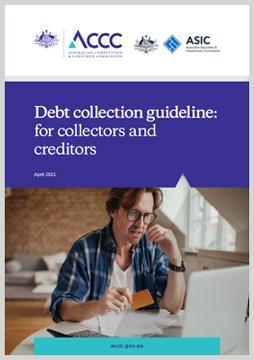On this page
How debtors should be treated
People who owe money are commonly referred to as debtors.
Debtors, and others connected to a debt, should be treated with fairness, respect and courtesy.
A debt collector should only contact a debtor for a reasonable purpose and only when necessary.
Case study video
Watch the video for information about what debt collectors can and can't do.
The story, all names, characters, and incidents portrayed in this video are fictitious. No identification with actual persons (living or deceased), places, buildings, and products is intended or should be inferred.
Illegal behaviour and debt collection
Under Australian law, a debt collector must not:
- use physical force
- use coercion
- unduly harass or hassle the debtor
- mislead or deceive the debtor
- take unfair advantage of any vulnerability, disability or similar affecting a debtor. This can amount to unconscionable conduct.
These laws also apply when contacting anyone connected to a debtor. This includes a spouse, partner or family member.
Report assault or threats of violence to the police.
Debt collectors must protect the personal information of debtors and third parties. Contact the Office of the Australian Information Commissioner if a debt collector or creditor has broken privacy laws.
When and how a debtor can be contacted
Acceptable reasons for contacting a debtor
There are situations where contacting a debtor may be reasonable.
- Giving information about the account and money owed
- Making a demand for payment
- Accurately explaining the consequences of non-payment, such as legal remedies the debt collector or creditor can seek, or service restrictions that may apply, such as disconnection of a service
- Arranging for repayment of a debt
- Suggesting a payment plan
- Reviewing existing payment plans after an agreed period
- Finding out why the debtor has not responded to contact
- Asking why an agreed repayment arrangement is not being followed
- Investigating if the debtor has changed their address without informing the debt collector, when there are grounds for believing this has occurred
- Sighting, inspecting or recovering a security interest, such as a vehicle.
When contact with a debtor can occur
Contact with a debtor should be limited to:
| Type of contact | Days | Contact should be limited to: |
|---|---|---|
|
Contact by telephone |
Monday to Friday |
7:30 am to 9 pm |
| Weekends | 9 am to 9 pm | |
| National public holidays | No contact recommended | |
| Face-to-face contact |
Monday to Friday |
7:30 am to 9 pm |
| Weekends | 9 am to 9 pm | |
| National public holidays | No contact recommended | |
| All workplace contact | Debtor's normal working hours if known, or 9 am to 5 pm on weekdays | |
Visits to a debtor’s home, or another agreed location, should be a last resort. The debtor can also ask for, or agree to, a visit.
If repayment plans can be worked out over the phone or in writing, face-to-face contact should not be needed.
Improving debt collection compliance
We review reports from consumers and small business and take action when we identify concerning practices.
Guideline for collectors and creditors

Guideline for debtors




